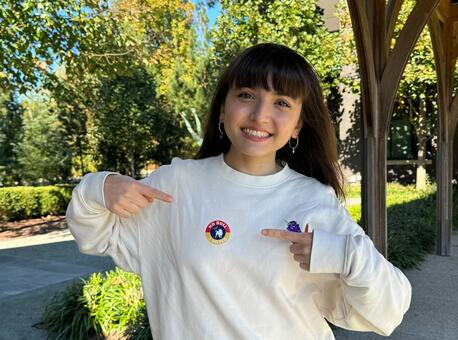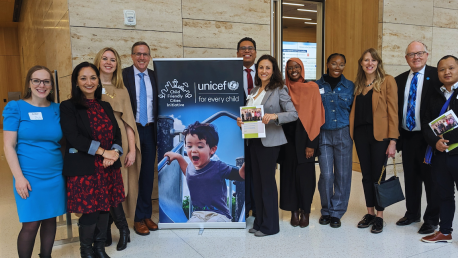
Young Leaders Cheer as Minneapolis Puts Child Rights Front and Center
Youth in Minneapolis are working to make their hometown a better place to live, as part of the UNICEF Child Friendly Cities Initiative.
City kids are on the rise. According to the World Bank, 56 percent of the world's population — 4.4 billion people — live in an urban setting. By 2050, an estimated 7 out of 10 children will be growing up in a city.
In 1996, UNICEF launched the Child Friendly Cities Initiative (CFCI) to support municipal governments in realizing the rights of children at the local level using the United Nations Convention on the Rights of the Child (CRC) as its foundation. CFCI offers young people a seat at the table to shape public policy, and provides opportunities for young volunteers to make their city a better place to live.
A conscientious choice to be accountable for child rights
To date, CFCI has been adopted in more than 3,000 municipalities in 57 countries. The first cohort of U.S. cities began the two-year process of achieving recognition as a UNICEF Child Friendly City or County in 2020.
On Feb. 14, 2023, Minneapolis became the second city in the U.S. (after Houston, in August 2022) to be designated a UNICEF Child Friendly City candidate. As Danielle Goldberg, UNICEF USA Managing Director of U.S. Programs and CFCI, put it: "This was the day that Minneapolis made a conscientious choice to be accountable for child rights."
Minneapolis Youth Congress: Reimagining their city
A CFCI Local Action Plan identifies key priorities
For Minneapolis, this is the latest step in a long history of championing the rights of children, dating back to at least 1989 when then-Mayor Donald Fraser signed on to the CRC. Now, as of February 2023, the city has a CFCI Local Action Plan that prioritizes the needs and concerns of youth in local decision-making.
In the coming year, the city will implement its local action plan to receive the formal UNICEF Child-Friendly City recognition. The plan addresses four top priorities: emergency management and preparedness planning, youth voice in decision-making spaces, community safety and child rights learning and engagement education and awareness. Or, as a member of the Minneapolis Youth Congress said proudly: "No decisions about us without us."
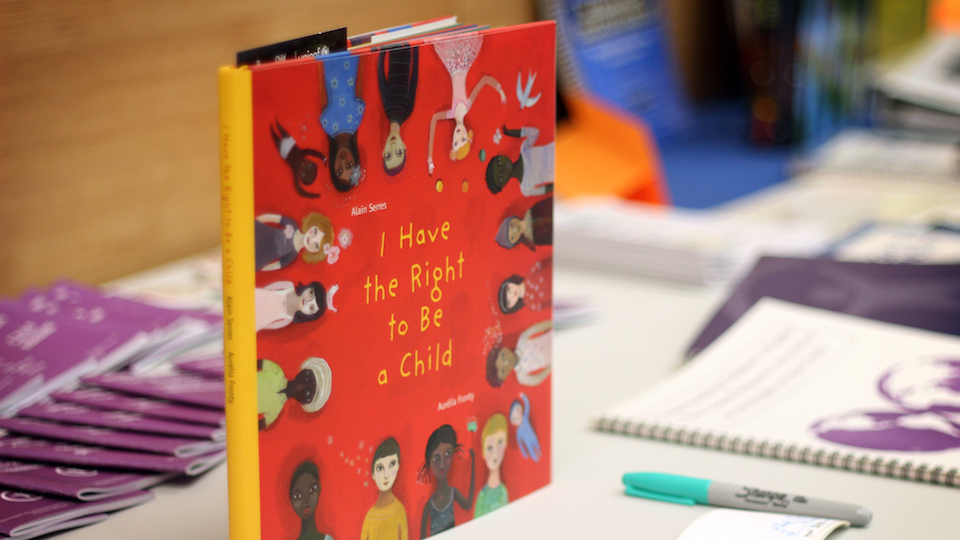
An on-ramp to civic engagement for children and youth
When asked why the local action plan is vital for the city of Minneapolis, youth volunteer Oluwaseun Abolade said, "Because it holds the city accountable. In many spaces, especially in big cities, kids often don't have a say in what affects them. With the action plan, the city has the ability to serve as the kids' voices or at least provide them with the space to make decisions that concern them. There is that double and triple check on kids. Overall, the child rights-focused framework allows for a better community for all children."
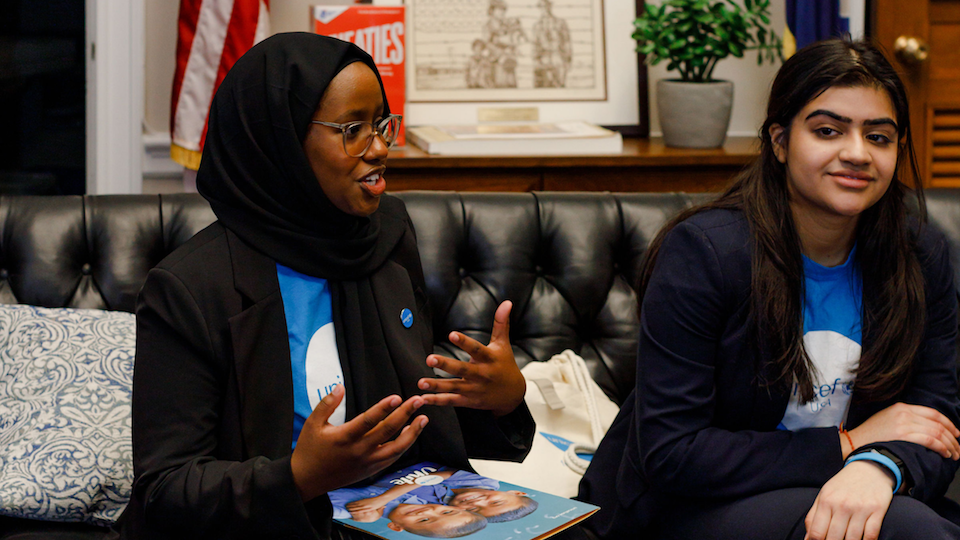
UNICEF USA National Youth Council members Salma Abdi, left, and Radhika Sharma advocate for UNICEF during a meeting in the office of U.S. Rep. Grace Meng (D-NY 6th District) on Capitol Hill. © photo courtesy of Salma Abdi
Children have a right to feel safe in their community
Salma Adbi, a UNICEF USA National Youth Council member who attended the ceremony, said she was pleased to see "community leaders and stakeholders all come together to collaborate, celebrate and learn." Being a part of the CFCI process has taught her a lot about "what is important to young people in the city of Minneapolis."
Abdi joined her school's UNICEF Club during her first year of high school. Now a college sophomore in a youth leadership role at UNICEF USA, she has discovered the similarities between UNICEF's global work and the issues faced by children and youth in her own community. "Minneapolis's local action plan highlighted specific concerns that stem from the murder of George Floyd, so it is great to see that community safety is not only a concern for elected officials, but also young people."
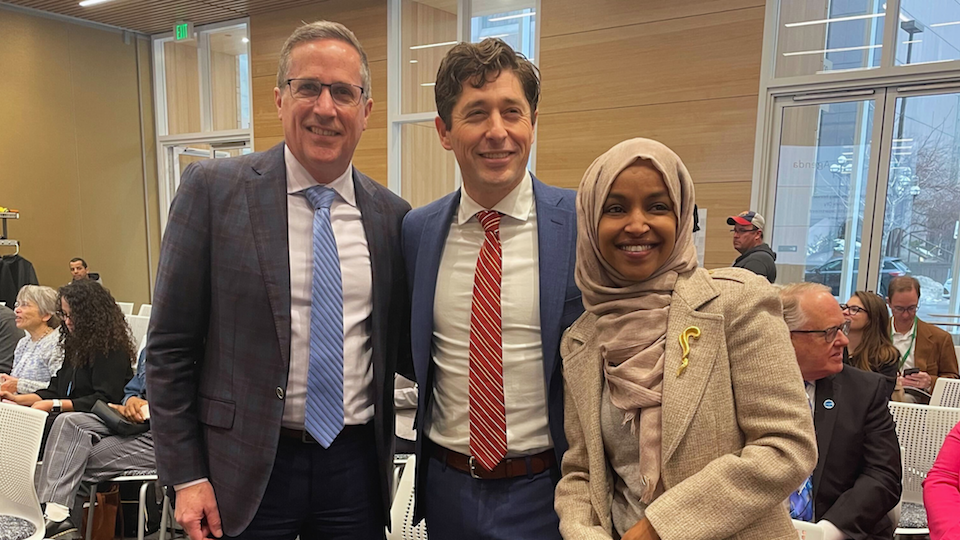
Show your support for child-friendly cities
Youth aren't the only people welcoming this change. UNICEF USA President and CEO Michael Nyenhuis, a Minnesota native, said, "The CFCI is a methodology that communities all around the world have used to really take an inventory of the way their policies, programs and budgets impact children in their communities, especially the most vulnerable and excluded children."
Guided by local CFCI priorities, UNICEF USA will continue working with UNICEF USA Clubs, youth representatives, municipal and community-based partners, and adult allies to support Minneapolis's efforts to become a full-fledged Child Friendly City. In doing so, they will model for communities across the country what is possible when local leaders, children, youth and other stakeholders come together to put child rights into action.
No matter where you live, you can show your support for UNICEF's Child Friendly Cities Initiative by asking your local municipal leader to put children first in local decision-making.
HOW TO HELP
There are many ways to make a difference
War, famine, poverty, natural disasters — threats to the world's children keep coming. But UNICEF won't stop working to keep children healthy and safe.
UNICEF works in over 190 countries and territories — more places than any other children's organization. UNICEF has the world's largest humanitarian warehouse and, when disaster strikes, can get supplies almost anywhere within 72 hours. Constantly innovating, always advocating for a better world for children, UNICEF works to ensure that every child can grow up healthy, educated, protected and respected.
Would you like to help give all children the opportunity to reach their full potential? There are many ways to get involved.




